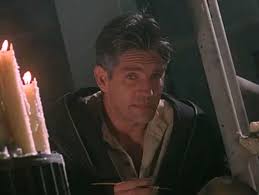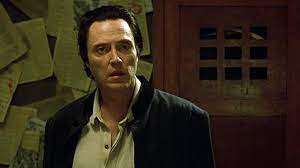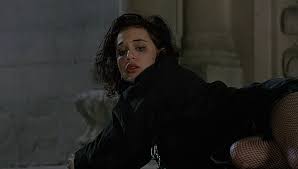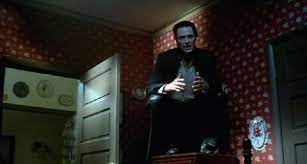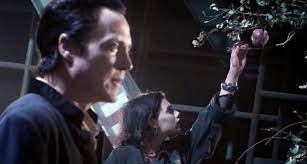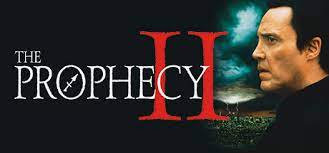“The Prophecy II” (1998)
Drama

Running Time: 83 minutes
Written by: Matt Greenberg and Greg Spence
Directed by: Greg Spence
Featuring: Christopher Walken, Russell Wong, Jennifer Beals, Brittany Murphy and Steve Hytner
Gabriel: “There’s a small step from prophet to martyr. Can you take it?”
Critical Commentary
“The Prophecy II,” directed by Greg Spence and released in 1998, is a supernatural horror film that serves as a direct sequel to the 1995 cult classic “The Prophecy.” The original film, directed by Gregory Widen, introduced audiences to a unique take on the eternal battle between angels and demons, with Christopher Walken’s iconic portrayal of the archangel Gabriel as its central character. In this second instalment, Walken reprises his role, offering fans another glimpse into this dark and mystifying universe where celestial forces clash in a battle for control over humankind.
With its intriguing premise, engaging performances, and thought-provoking themes, “The Prophecy II” may not have achieved the same level of recognition as its predecessor, but it nonetheless holds its own as a worthy follow-up. This review delves into the film’s plot, characters, visual effects, and its place within the broader context of the horror genre.
“The Prophecy II” picks up where the first film left off. The original movie explored the notion of angels waging a war against each other for control of heaven and earth, using human souls as the ultimate prize. In this instalment, the narrative introduces a new character, Danyael (played by Russell Wong), a fallen angel who has been expelled from heaven for rebelling against God’s plans. He is unique in that he is neither fully angelic nor human, setting the stage for a fresh perspective on the angelic conflict.
Danyael finds himself pursued by both angels and demons who covet his existence and believe that he may tip the balance of power in their favor. The film’s primary antagonist is again the archangel Gabriel (Christopher Walken), who has defected from the angelic ranks and is hell-bent on waging a war against God. Gabriel’s unrelenting pursuit of Danyael forms the crux of the narrative, as he believes that Danyael’s child may be the key to winning the war against heaven.
The film’s protagonist, Valerie Rosales (played by Jennifer Beals), becomes entangled in this celestial conflict as she discovers she is pregnant with Danyael’s child. The revelation of her pregnancy brings her to the attention of both angels and demons, who seek to use her as leverage in their ongoing battle.
“The Prophecy II” continues to explore the theme of free will versus predestination, a theme that was central to the first film. The concept of angels defying God’s will and acting independently is presented as a driving force behind the plot. Danyael’s rebellion and his quest to protect his unborn child serve as a symbol of human determination and the power of choice.
This theological exploration adds depth to the film and elevates it beyond the standard horror fare. It delves into questions about the nature of divinity, the significance of human existence, and the blurred boundaries between good and evil. “The Prophecy II” invites viewers to contemplate the idea that celestial beings, like humans, are capable of making choices that defy their predestined roles.
Christopher Walken’s reprisal of the role of Gabriel is a highlight of “The Prophecy II.” His portrayal of the disillusioned archangel is captivating, striking a perfect balance between otherworldly menace and human-like vulnerability. Walken’s performance helps anchor the film in the same dark, enigmatic atmosphere that made the first instalment memorable.
Russell Wong’s portrayal of Danyael offers a fresh perspective on the film’s celestial characters. As a fallen angel, Danyael grapples with questions of identity and purpose, and Wong effectively conveys his inner conflict and determination to protect his child. Wong’s performance is integral to the film’s success, as he provides the audience with a relatable character in the midst of an otherworldly conflict.
Jennifer Beals as Valerie Rosales, the film’s human protagonist, brings a sense of emotional grounding to the story. Her character serves as the bridge between the celestial and human worlds, and Beals’s performance conveys the fear and confusion that anyone would feel when thrust into such a surreal and dangerous situation.
“The Prophecy II” maintains the dark and brooding visual style established in the first film. The use of practical effects, such as the eerie depiction of supernatural occurrences and the transformation of celestial beings, creates a palpable atmosphere of dread and mystique. The cinematography, handled by Richard Clabaugh, effectively captures the otherworldly elements of the story, including battles between angels and demons, and the desolation of abandoned locations.
The film’s visual effects and practical makeup work are a mixed bag. While some sequences, particularly those involving angelic transformations, are executed impressively given the film’s budget constraints, others appear dated by today’s standards. However, it’s important to remember that “The Prophecy II” was released in 1998, and some allowances should be made for the technology available at the time.
The dark and atmospheric visuals, along with the film’s haunting score by David C. Williams, contribute to the movie’s eerie and compelling aesthetic, adding to its overall appeal.
“The Prophecy II” may not have achieved the same level of recognition as its predecessor, but it retains a dedicated fan base. The film’s contribution to the horror genre lies in its unique take on the eternal battle between good and evil, introducing complex celestial characters who defy traditional angelic stereotypes. Its theological and philosophical themes continue to make it a thought-provoking piece within the horror genre.
Moreover, the film’s success paved the way for three more sequels, “The Prophecy 3: The Ascent” (2000), “The Prophecy: Uprising” (2005), and “The Prophecy: Forsaken” (2005). These follow-up movies expanded the universe created by the original film, further exploring the war between angels and demons, though the later sequels received mixed critical reception.
Despite being a sequel, “The Prophecy II” manages to maintain a sense of mystery and intrigue throughout its runtime. It keeps the audience engaged by expanding the lore of the first film and introducing new, complex characters. The film’s portrayal of celestial beings as fallible, driven by their desires, and subject to inner conflicts adds depth to the story and allows for a more nuanced exploration of its theological themes.
The movie excels in exploring the idea of rebellion against predestination. Danyael, as a fallen angel, is a symbol of defiance against a divine plan, making him a compelling character to follow. His inner turmoil, the decisions he makes, and his determination to protect his child become central to the narrative. The interplay between free will and destiny is a core theme that engages the audience’s intellect and emotions.
The character of Gabriel remains the charismatic antagonist he was in the first film. Christopher Walken’s portrayal is a testament to his acting prowess, adding layers of complexity to the archangel’s character. Gabriel’s journey from a loyal servant of God to a rebel seeking to overthrow Him is a fascinating character arc, and Walken’s performance keeps the audience captivated throughout the film.
Jennifer Beals as Valerie Rosales provides the audience with a human perspective on the celestial conflict. Her character is the embodiment of innocence caught in the crossfire of an otherworldly battle. Beals effectively conveys the confusion and fear that anyone would feel when thrust into such a surreal and perilous situation. Her emotional connection to Danyael’s plight adds a human element to the story, making it more relatable for the audience.
The supporting cast, including Brittany Murphy and Glenn Danzig, also delivers commendable performances. Murphy plays Izzy, a quirky and vulnerable character with ties to the celestial conflict. Her portrayal adds an element of unpredictability to the story. On the other hand, Danzig’s character, Samayel, is a demon seeking to manipulate the events. His menacing presence and portrayal add an extra layer of darkness to the narrative.
The film’s visual effects and practical makeup work, while occasionally showing their age, serve the story well. The eerie and supernatural elements of the film, such as the angelic transformations, are effectively executed, contributing to the film’s atmosphere of mystique and tension. The practical effects help create a tangible and chilling experience, which is essential for a horror movie of this nature.
The cinematography by Richard Clabaugh enhances the film’s dark and brooding atmosphere. It effectively captures the otherworldly elements of the story, including the battles between angels and demons and the desolation of abandoned locations. The visuals and the haunting score by David C. Williams combine to create an eerie aesthetic that complements the film’s themes and narrative.
“The Prophecy II” leaves an indelible mark on the horror genre with its unique take on the eternal battle between good and evil. It succeeds in expanding the lore established in the original film, delving deeper into the complex relationships and motivations of celestial beings. The movie’s exploration of the struggle between free will and destiny is intellectually stimulating, elevating it beyond typical horror fare.
The film’s legacy, although not as well-known as some other horror franchises, remains significant for its thought-provoking themes and memorable performances. The subsequent sequels, while receiving mixed critical reception, continued to explore the celestial conflict, further cementing the original film’s impact on the genre.
“The Prophecy II” is a commendable sequel that successfully builds upon the intriguing premise established in its predecessor. While it may not reach the same iconic status as the original film, it offers a unique blend of horror, supernatural elements, and theological themes that cater to fans of thought-provoking, character-driven horror.
With strong performances, especially from Christopher Walken and Russell Wong, “The Prophecy II” provides a captivating and at times chilling narrative that delves into complex questions of free will and destiny. Its dark and brooding atmosphere, along with its practical effects, contributes to the film’s appeal and makes it a noteworthy addition to the horror genre.
For fans of the original “The Prophecy” or those who appreciate horror with philosophical undertones, “The Prophecy II” is a sequel that deserves recognition and a revisit. It offers a glimpse into a supernatural realm where angels and demons engage in a celestial battle with human souls hanging in the balance, reminding us that even celestial beings are not immune to the complexities of choice and destiny.
Special Features
- Audio Commentary by film historians Bryan Reesman & Max Evry
